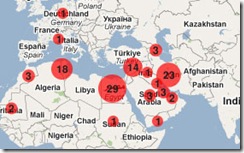New media journalists around the globe face technological barriers and increasing dangers when reporting from within the boundaries of protective governments. A new site by Global Voices Advocacy maps and tracks journalists who have been threatened or arrested and aggregates the information into a robust map database with real-time statistics and details of each case.
 The site, Threatened Voices, aims to raise awareness to the growing number of bloggers and other online journalists being persecuted across the world. While both traditional and new media reporters have faced recent danger, the site acknowledges the growing importance and number of online journalists in the global media.
The site, Threatened Voices, aims to raise awareness to the growing number of bloggers and other online journalists being persecuted across the world. While both traditional and new media reporters have faced recent danger, the site acknowledges the growing importance and number of online journalists in the global media.
“Online journalists and bloggers now represent 45% of all media workers in prison worldwide,” Global Voices says in a press release.
The captures of high profile journalists abducted in Iraq and North Korea have called attention to the dangers of the profession, while “the harshest consequence for many has been the politically motivated arrest of bloggers and online writers for their online and/or offline activities, in some tragic cases even leading to death,” Global Voices reports.
The site allows users to enter their own location and anecdotal details, drawing from the international community of journalists to fill the site’s map content.
Outside of the central map, other features of the site include statistics and analysis organized in a timeline or by country. The site lists China, Egypt and Iran as the top three countries, respectively, with the highest number of recorded cases of threatened or arrested bloggers.
Each case is tracked to record whether the blogger was threatened or arrested and if arrested, when and if they were released. Another aim of the site is to allow the online community to call attention to campaigns to free particular journalists.
The Committee to Protect Journalists, one of the partners of the Threatened Voices project released a report in April on the 10 Worst Countries to be a Blogger.
Along with a thorough description of each country (at the time, Burma was listed at the top), the article quotes CPJ Executive Director Joel Simon, who emphasizes, “Freedom of expression groups, concerned governments, the online community, and technology companies need to come together to defend the rights of bloggers around the world.”
The site was also built in collaboration with the BBC, Amnesty International and Human Rights Watch, among others.
Sign up today to have our latest posts delivered straight to your inbox.